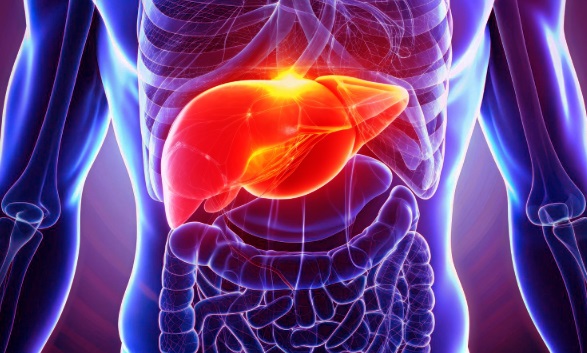Nikhil Prasad Fact checked by:Thailand Medical News Team Jan 27, 2025 2 months, 3 weeks, 3 days, 54 minutes ago
Medical News: With obesity and its associated health risks reaching epidemic proportions, scientists are uncovering critical links between obesity and metabolic conditions like metabolic-associated steatohepatitis (MASH), a severe form of fatty liver disease. These conditions often lead to liver damage, type 2 diabetes, and even cardiovascular diseases. Despite the availability of drugs for diabetes and obesity, treatments specifically targeting metabolic-associated liver disease remain scarce. A groundbreaking study from researchers at West China Hospital, Sichuan University, and The Second Affiliated Hospital of Chongqing Medical University provides new insights into this pressing issue.
 Arginase 1 Drives Liver Fat Production Through Unusual Mechanisms
Arginase 1’s Surprising Role in Lipid Metabolism
Arginase 1 Drives Liver Fat Production Through Unusual Mechanisms
Arginase 1’s Surprising Role in Lipid Metabolism
The research delved into the functions of arginase 1 (Arg1), an enzyme traditionally associated with the urea cycle, which detoxifies ammonia in the liver. However, scientists have uncovered a new and unexpected role for Arg1 in regulating fat production in the liver. This
Medical News report reveals that Arg1 can increase lipid accumulation in both liver and fat cells, linking it to obesity and fatty liver disease.
Using genetically engineered mice that lack Arg1 in their livers, researchers observed significant reductions in liver and fat cell lipid accumulation. This effect was consistent across different obesity models, whether genetically or diet-induced. These findings suggest that Arg1 could be a promising target for therapeutic intervention in obesity and metabolic liver disease.
How Does Arg1 Influence Lipogenesis?
Arg1 appears to regulate lipogenesis - the production of fats in the liver - through its interaction with a protein called extracellular signal-regulated kinase 2 (ERK2). This interaction disrupts the function of ERK2 by promoting its degradation. In turn, this activates two critical pathways, AKT/mTOR/PPARγ and Elk1/c-Fos/PPARγ, which enhance fat production. Importantly, Arg1’s effect on ERK2 is independent of its traditional role in ammonia detoxification.
To confirm this, researchers introduced peptides designed to mimic the substrate-binding site of ERK2. These peptides effectively blocked the interaction between Arg1 and ERK2, reducing fat accumulation and improving metabolic health in mouse models. The study highlights the therapeutic potential of targeting the Arg1-ERK2 interaction for treating obesity and fatty liver disease.
Key Findings from the Study
-Liver-Specific Arg1 Knockout Mice: Using advanced genetic engineering, scientists created liver-specific Arg1-deficient mice. These mice displayed lower fat accumulation in the liver and fat tissue despite normal food intake. The absence of Arg1 resulted in smaller fat cells and reduced levels of triglycerides and free fatty acids.
-Arg1 Inhibition with BEC: A chemical inhibitor of Arg1, S-(2-bromoethyl)-L-cy
steine (BEC), was administered to obese mouse models. Treated mice showed significant reductions in body weight, liver size, and fat accumulation. Importantly, this treatment did not affect overall arginine levels in the blood, suggesting a specific role for Arg1 in lipid metabolism.
-Disruption of Arg1-ERK2 Interaction: By targeting the binding mechanism between Arg1 and ERK2, researchers demonstrated that this interaction is central to Arg1’s role in promoting lipogenesis. Peptides that blocked this interaction improved lipid profiles and reduced liver fat accumulation.
-Mechanistic Insights: Arg1 binds to ERK2 via a unique S-shaped motif, competing with other proteins like RSK2 and Elk1. This binding promotes ERK2 degradation and activates pathways that drive fat production in the liver.
Potential for Therapeutic Applications
The study introduces a novel strategy to combat obesity and metabolic liver disease by targeting the Arg1-ERK2 interaction. Peptide-based therapies that disrupt this interaction have shown promising results in preclinical models. Unlike traditional drugs, these peptides are highly specific, reducing the risk of side effects. Moreover, they effectively lowered liver fat levels without causing arginine imbalances.
Conclusion: A Step Forward in Metabolic Health
The discovery of Arg1’s unexpected role in lipid metabolism offers a fresh perspective on managing obesity and metabolic-associated liver disease. By elucidating the non-canonical functions of Arg1, this research paves the way for innovative therapies that target specific molecular interactions. The use of peptides to disrupt the Arg1-ERK2 interaction represents a significant advance in precision medicine for metabolic disorders.
The findings also underscore the importance of metabolic enzymes in broader physiological processes beyond their traditional roles. As the prevalence of obesity and fatty liver disease continues to rise, these insights could lead to the development of safer and more effective treatments.
The study findings were published on a preprint server and are currently being peer reviewed.
https://www.researchsquare.com/article/rs-5630831/v1
For the latest on metabolic-associated liver disease, keep on logging to Thailand
Medical News.
Read Also:
https://www.thailandmedical.news/news/liver-stiffness-overcomes-steatosis-in-predicting-mortality-in-masld-patients
https://www.thailandmedical.news/news/new-perspectives-on-fatty-liver-disease-awareness
https://www.thailandmedical.news/news/quercetin-as-a-potential-treatment-for-fatty-liver-disease
https://www.thailandmedical.news/news/natural-compound-from-waterlily-shows-promise-in-fighting-fatty-liver-disease
